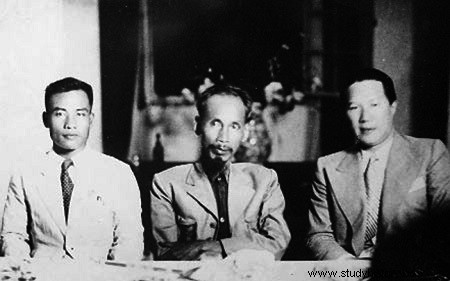
Here then, since March 10, is Japan master of Indochina. If he pretends not to question the principle of our sovereignty, he nevertheless strives to extinguish our influence and undermine our authority. The agents of the Kempeïtaï, faithful to their plan for "Greater Eastern Asia", endeavor to prepare our eviction and to make impossible our return.
The emperor of Annam, Bao-Daï , enters the first in the Japanese game. By his proclamation of March 11, 1945, he abolished the protectorate treaties formerly made with France, and proclaimed the independence of Vietnam. But Bao-Dai no longer represents much and the Japanese, who know this well, are pushing towards power men known for their nationalism and for the disputes they had, as a result, with the French authorities.
Soon, the impotence of the official power, the exactions of the Japanese, the disorganization of the administration, added to the destruction of the communication channels and the port installations, due to the American bombardments, cause a serious economic crisis , followed by a famine from which the population suffered cruelly, that of Tonkin in particular. This situation plays into the hands of revolutionary propaganda and offers a particularly favorable ground for subversive action. Also the Viet-Minh will exploit the circumstances with consummate skill.
Grouped together in the upper region in 1941, the members of the various Vietnamese revolutionary movements, mainly those of the dissolved Indochinese Communist Party, had, in May, at the congress of Tsin Tsi, grouped together within the Viet Nam Doc Lap Dong Minh, or, for short, Viet-Minh.
It is this Viet-Minh who now emerges from the shadows and, under the leadership of Ho Chi Minh, will know how to make the most of the situation created by the coup of March 9, 1945. Pretending to have no other concern than to fight Japanese fascism, the Viet Minh League, as the Americans say, has no trouble disguising itself as a nationalist movement , thus benefiting from the sympathy and support of the Americans, from whom Ho Chi Minh is well known and from whom he obtains arms and advisers.
Chiang Kai-Shek's Kuo-min-tang, which had nevertheless hunted down the Vietnamese communists who had taken refuge on its territory and imprisoned Ho Chi Minh for a while, would allow itself to be deceived for some time.
With the French too, the Viet-Minh seeks to enter into relations, I mean with the representatives of the provisional government of the French Republic, whom the Vietnamese are beginning to call the "new" French. Thus in July 1945 Ho Chi Minhme sent Kouen-Ming a five-point memorandum, which outlines the future positions of France in Indochina, as he envisages them.
I was then, in Kouen-Ming, the head of mission 5, branch in China of the S.L.F.E.O. where I was waiting for the moment to participate in the return of France to Indochina. It was indeed up to me to foresee, as far as possible, what difficulties France would encounter in achieving this and consequently, in what disposition we would find our former proteges.
As for this mysterious Ho Chi Minh, where he was only just beginning to know that he was none other than the dumb revolutionary Nguyen Ai Quoc, who had been the companion of Vaillant-Couturier and Cachin at the Congress of Tours in 1920, and the collaborator faithful of Borodin, in China, during the years 1924 and 1925. After years of exile and maquis, he had just reappeared on the front of the stage under this Chinese name of Ho Chi Minh ("the one who enlightens") ).
